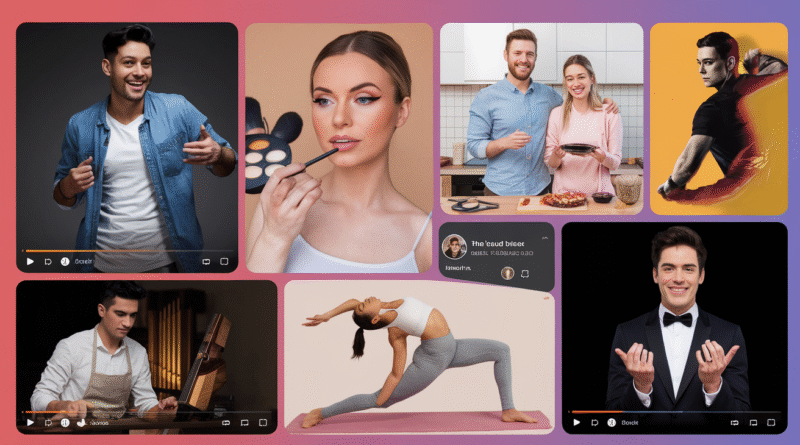The Rise of Short-Form Video: How TikTok is Redefining Celebrity Culture
Social media is constantly evolving, and with it, so is the concept of celebrity. While platforms like Instagram and YouTube were once dominant, a new format has emerged as the leader: short-form video. TikTok, the foremost platform in this category, has transformed how we consume content, engage with creators, and even create fame. Through its short, shareable videos, TikTok has fostered a fast-paced and accessible form of celebrity, blending the lines between ordinary users and global stars. This article examines how short-form video is reshaping celebrity culture and the entertainment industry.
The Rise of Short-Form Video
Since its global launch in 2018, TikTok has accumulated over a billion monthly active users, quickly becoming the go-to app for brief, captivating videos. Its format—videos ranging from 15 seconds to 3 minutes—differs significantly from the longer content on YouTube or the curated visuals of Instagram. The platform’s appeal lies in its immediacy, creativity, and potential for users to go viral in a short time.
Short-form videos stand out for their high engagement and accessibility. TikTok’s AI-driven algorithm, which customizes content for each user, makes it easy for new creators to gain exposure. This has leveled the playing field in ways that Instagram and YouTube never fully did, allowing virtually anyone to go viral regardless of follower count. A single post can garner millions of views in hours, turning ordinary users into overnight stars.
TikTok not only nurtures new influencers but also accelerates trends and memes at lightning speed. Its viral nature, coupled with low production costs, allows for an explosion of creative content, cementing its dominance in the short-form video space.
A New Path to Fame
One of TikTok’s most significant contributions to celebrity culture is the way it democratizes fame. In the past, becoming a celebrity required access to gatekeepers in industries like TV, film, or music. While social media began to chip away at those barriers, TikTok has shattered them completely.
Unlike Instagram and YouTube, where success often depends on follower counts and high production quality, TikTok thrives on creativity, relatability, and participation in trends. Regular users—whether dancers, comedians, chefs, or activists—can achieve huge popularity based solely on the appeal of their content. Many TikTok stars, such as Charli D’Amelio and Addison Rae, rose to fame by participating in dance challenges and lip-sync videos, accumulating massive followings without needing prior fame.
This shift has given rise to everyday celebrities who gain influence in specific niches or communities. TikTok encourages interaction, with users collaborating through features like “duets” or “stitches,” further breaking down the barriers between creators and their fans. As a result, TikTok celebrities are often seen as more approachable and relatable than traditional stars, a trait that has become increasingly important in the digital age.
TikTok’s Algorithm: The Fame Engine
TikTok’s powerful algorithm is the driving force behind its ability to create celebrities. Unlike other platforms that focus on followers or likes, TikTok’s algorithm curates highly personalized content for each user based on their preferences. The « For You » page, which users see when they open the app, features trending and recommended videos based on individual user behavior.
What makes TikTok stand out is that even users with a small following can reach massive audiences if their content resonates. A video from an unknown creator can appear on the « For You » page and gain millions of views, leading to viral fame.
This new dynamic has shifted celebrity culture. Traditional celebrities, such as actors or musicians, now find themselves trying to match the success of TikTok creators. Even well-known figures on TikTok must adapt to the platform’s style and trends to stay relevant with the community.
The Rise of Authenticity in Short-Form Video
Authenticity has long been a buzzword in social media, but TikTok takes it to a new level. Unlike Instagram, which has been criticized for showcasing unrealistic, polished images, TikTok content tends to be more raw, spontaneous, and unfiltered. TikTok stars, in particular, gain popularity by sharing their everyday lives in a candid way.
This shift toward authenticity has changed how celebrities are perceived. TikTok creators are celebrated for their relatability and down-to-earth nature, contrasting with the often distant, glamorous aura of traditional stars. For example, the D’Amelio sisters, Charli and Dixie, frequently share personal glimpses into their daily lives, making them feel more like peers than unattainable figures.
As a result, even traditional celebrities are adapting. To maintain their relevance with younger, social-media-savvy audiences, they must show a more genuine, unpolished side on platforms like TikTok.
Impact on Music and Fashion
TikTok’s influence isn’t just limited to creating new celebrities; it’s also reshaping industries like music and fashion. The platform has become a crucial tool for promoting music. Viral trends, dances, and challenges often feature popular songs, boosting streams and sales. Tracks like Lil Nas X’s « Old Town Road » and Doja Cat’s « Say So » owe much of their success to TikTok. A viral dance or sound can turn a relatively unknown song into a chart-topper almost overnight.
The platform has also given rise to a new kind of music celebrity—those who start on TikTok. Creators like Lil Huddy and Bella Poarch leveraged their popularity on the app to launch music careers, blurring the lines between social media influencers and traditional music artists.
In fashion, TikTok has become a hub for trends, with users sharing their outfits, participating in style challenges, and influencing followers’ buying decisions. Fashion brands are collaborating with TikTok influencers to promote their products, and fast-fashion companies like Shein have thrived on the platform through « haul » videos and fashion content that quickly drives sales.
The Challenges of TikTok Fame
While TikTok’s accessibility offers many opportunities, it also presents challenges. Fame on the platform is often short-lived. Viral stars can rise quickly but may fade just as fast if they fail to keep up with the constant demand for fresh content. Creators face pressure to stay relevant in an ever-changing social media landscape, which can lead to burnout.
Additionally, TikTok’s algorithm-driven nature can feel unpredictable. Creators may struggle to understand why some videos go viral while others don’t, leading to frustration over the platform’s lack of transparency regarding how its algorithm works.
Conclusion: TikTok and the Future of Fame
The rise of short-form video, led by TikTok, has fundamentally changed the dynamics of celebrity. Fame is no longer exclusive to those who pass through traditional gatekeepers; it’s now more accessible, fast-moving, and fleeting. TikTok has democratized fame, giving everyday users the chance to become global celebrities and influencing industries like music, fashion, and entertainment.
As TikTok continues to grow and impact other platforms, short-form video is likely here to stay. This signals a new era in celebrity culture—one that is more dynamic, relatable, and deeply intertwined with the fast-paced world of digital trends.






